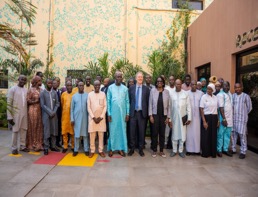
The Gambia Infrastructure Sector Assessment Study conducted by the World Bank presented a diagnostic assessment of Gambia’s transport sector to inform the government’s strategic planning of the sector.
The event was also meant to identify major investment gaps, identify opportunities to improve resource allocation and private financing and pinpoint policy gaps and weaknesses in the institutional and regulatory framework.
The forum, held at the Bakadaji Hotel in Kotu, witnessed slide presentation on The Gambia InfraSAP study report delivered by Mr. Hatem Chahbani, senior transport specialist of World Bank.
In his opening statement, Ebrima Sillah, minister of Works and Infrastructure, recalled that the World Bank recently funded an Infrastructure Assessment Study (InfraSAP) for The Gambia’s Transport Sector.
He said the study presents a diagnostic assessment of the Transport and Infrastructure Sectors of The Gambia aimed at assisting the government in strategic planning, identifying significant investment gaps and opportunities to enhancing resource allocation and private financing and to identifying policy gaps and weaknesses in the institutional and regulatory frameworks within the sector.
The study, he said also proffers evidence-based recommendations to the sector.
Minister Sillah noted that transport and Infrastructure are critical economic and social cohesion enablers for any society. He said it is a known fact that infrastructure in most African countries falls below standards, particularly in areas related to “access and quality”.
“Following the launch of the Africa Continental Free Trade Area (AfCFTA) in April 2018, in Kigali, Rwanda, which established the African common market of a combined GDP of USD 1.3 trillion, with a population of about 1.3 billion people – the need to reposition African economies, operating under the FTA was apparent,” he stated.
In his welcoming remarks, Mr. Franz Drees-Gross, World Bank Infrastructure Regional Director for West and Central Africa Regions, said the purpose of the forum was to disseminate an assessment which the World Bank carried out on transport infrastructure and services in Gambia. It was an opportunity to hear from all stakeholders’ thoughts on not only the study but also what could be done to help this sector to support the country’s development, he said.
“Connectivity is the lifeline of any infrastructure system. It enables the efficient movement of goods, services, and people. We will explore ways to enhance connectivity, both within and between regions to foster economic growth and social inclusion,” he said.
“Governance is another crucial element in infrastructure development. Effective governance ensures transparency, accountability, and the participation of all stakeholders. We will delve into the importance of good governance practices and discuss strategies to strengthen governance mechanisms in the infrastructure sector, he advanced.
Read Other Articles In Headlines
Trade Ministry warns mini, supermarkets over coins
Oct 7, 2020, 10:49 AM




